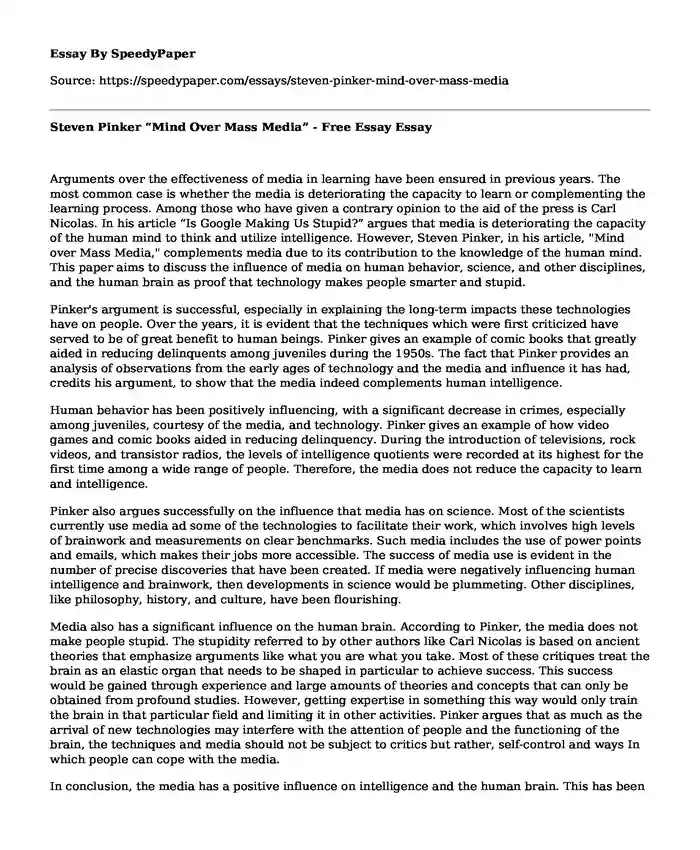
| Type of paper: | Essay |
| Categories: | Learning Intelligence Media Human behavior |
| Pages: | 3 |
| Wordcount: | 609 words |
Arguments over the effectiveness of media in learning have been ensured in previous years. The most common case is whether the media is deteriorating the capacity to learn or complementing the learning process. Among those who have given a contrary opinion to the aid of the press is Carl Nicolas. In his article “Is Google Making Us Stupid?” argues that media is deteriorating the capacity of the human mind to think and utilize intelligence. However, Steven Pinker, in his article, "Mind over Mass Media," complements media due to its contribution to the knowledge of the human mind. This paper aims to discuss the influence of media on human behavior, science, and other disciplines, and the human brain as proof that technology makes people smarter and stupid.
Pinker's argument is successful, especially in explaining the long-term impacts these technologies have on people. Over the years, it is evident that the techniques which were first criticized have served to be of great benefit to human beings. Pinker gives an example of comic books that greatly aided in reducing delinquents among juveniles during the 1950s. The fact that Pinker provides an analysis of observations from the early ages of technology and the media and influence it has had, credits his argument, to show that the media indeed complements human intelligence.
Human behavior has been positively influencing, with a significant decrease in crimes, especially among juveniles, courtesy of the media, and technology. Pinker gives an example of how video games and comic books aided in reducing delinquency. During the introduction of televisions, rock videos, and transistor radios, the levels of intelligence quotients were recorded at its highest for the first time among a wide range of people. Therefore, the media does not reduce the capacity to learn and intelligence.
Pinker also argues successfully on the influence that media has on science. Most of the scientists currently use media ad some of the technologies to facilitate their work, which involves high levels of brainwork and measurements on clear benchmarks. Such media includes the use of power points and emails, which makes their jobs more accessible. The success of media use is evident in the number of precise discoveries that have been created. If media were negatively influencing human intelligence and brainwork, then developments in science would be plummeting. Other disciplines, like philosophy, history, and culture, have been flourishing.
Media also has a significant influence on the human brain. According to Pinker, the media does not make people stupid. The stupidity referred to by other authors like Carl Nicolas is based on ancient theories that emphasize arguments like what you are what you take. Most of these critiques treat the brain as an elastic organ that needs to be shaped in particular to achieve success. This success would be gained through experience and large amounts of theories and concepts that can only be obtained from profound studies. However, getting expertise in something this way would only train the brain in that particular field and limiting it in other activities. Pinker argues that as much as the arrival of new technologies may interfere with the attention of people and the functioning of the brain, the techniques and media should not be subject to critics but rather, self-control and ways In which people can cope with the media.
In conclusion, the media has a positive influence on intelligence and the human brain. This has been seen in the positive impact it has had on science, human behavior, and brainwork. It does not influence the mind but rather complements its functioning. Therefore media should be embraced and appropriately utilized for the more significant benefit it has.
Cite this page
Steven Pinker "Mind Over Mass Media" - Free Essay. (2023, Aug 22). Retrieved from https://speedypaper.net/essays/steven-pinker-mind-over-mass-media
Request Removal
If you are the original author of this essay and no longer wish to have it published on the SpeedyPaper website, please click below to request its removal:
- Essay Sample on Delegation Skills
- Essay Example on Brand Management Strategies
- Free Essay: Porsche Case Study Analysis
- Long Term Effects of Childhood Bullying
- Free Essay Example - Hydrocarbons
- Essay Sample: Analyzing the Music of La La Land and Its Role in the Film
- Free Essay Sample on Teaching Strategies for Students with Hearing Impairments
Popular categories




